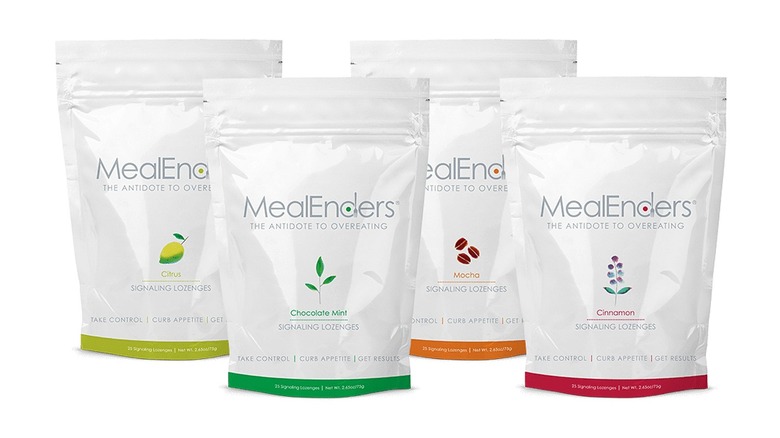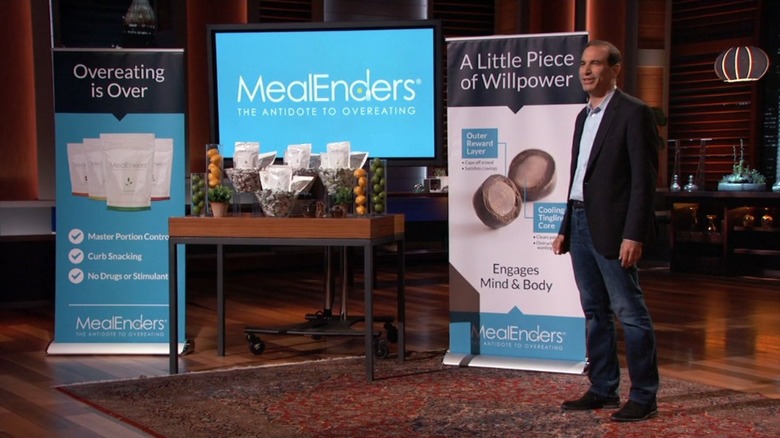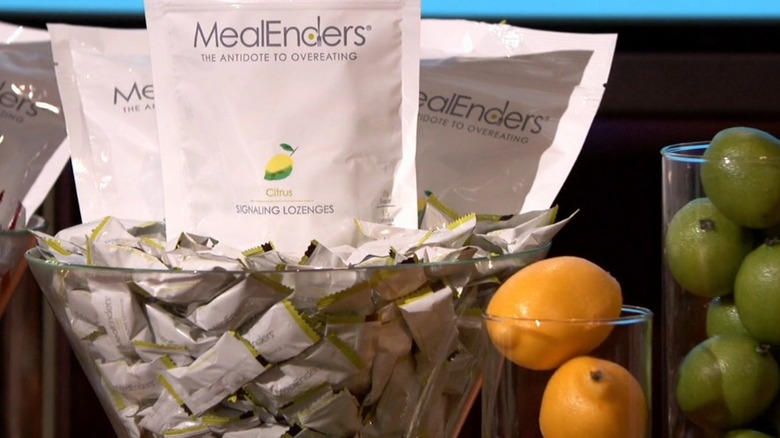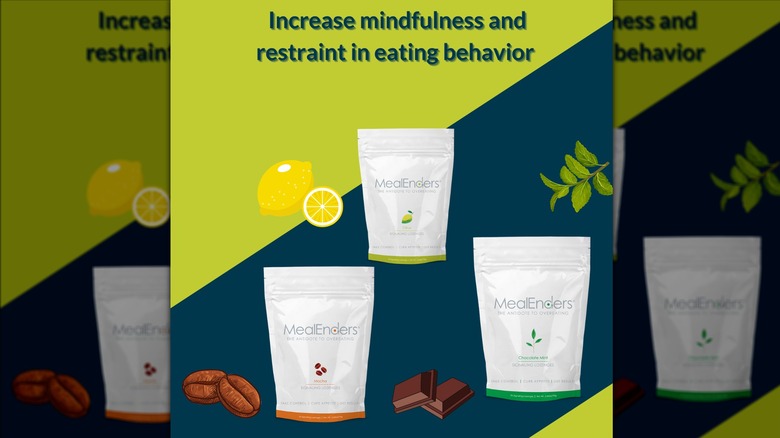Here's What Happened To MealEnders After Shark Tank
We may receive a commission on purchases made from links.
Mark Bernstein created MealEnders out of necessity. After being told by his doctor to try to lose weight to remedy some health issues, he knew he needed some help with his willpower. But nothing on the market fit what he was looking for. "I found that most of the weight management products focused on filling you up before you eat with unpleasant fibers and liquids, limiting what you eat with prepackaged and generally not very tasty foods, or even adulterating food with chemicals or additives to make you like them less," he told Heavy. His only answer seemed to be to find a solution himself.
His mother inadvertently helped him with his product when he told her what he was creating, and she suggested he should brush his teeth. MealEnders signaling lozenges consisted of tasty dessert-like flavors of mocha, citrus, chocolate, and cinnamon on the outside, with a cooling and tingling center. The outer layer tells your brain you're eating dessert, while the inside is meant to be reminiscent of teeth brushing, reminding you that you're not hungry. Bernstein brought his tablets to "Shark Tank" in 2017 and came prepared with facts and figures about how his MealEnders worked. Fans may remember that even though MealEnders wasn't among the best foods on "Shark Tank," this was the first time a weight loss product wasn't ridiculed and torn to shreds on the show according to Kevin O'Leary.
The sharks had doubts about the product's future
Mark Bernstein appeared on Season 8, Episode 19 of "Shark Tank" in 2017. During his pitch, Bernstein asked for $350,000 in exchange for 8% of MealEnders. The sharks had mixed feelings about the tablets, with Kevin O'Leary likening them to a bad date. "This is the end of the date, and I really hate her," he said.
Bernstein moved the conversation to sales. He explained that the company had sold $1.4 million worth of the product from inception. The sharks were incredulous, especially when Bernstein informed them that the product was only available on Amazon and through the MealEnders' website. Bernstein also claimed that only 2% of orders had been returned, suggesting a high level of customer satisfaction.
As Bernstein told them he's been putting around $85,000 towards advertising monthly, Mark Cuban pointed out that if even one person has lost weight on MealEnders, the product should've gone viral by then. Cuban said he liked the product but didn't think Bernstein had been advertising correctly, so he was the first to go out. Next was Robert Herjavec, who didn't like that it's a diet supplement.
O'Leary believed the product could help people manage their calorie intake, but he was turned off by the cooling and tingling effect, as was Lori Grenier. They both passed, which left Barbara Corcoran. She admitted she loved the product but thought getting it off the ground would cost too much, leaving Bernstein without a deal.
Some thought it was no different than eating hard candy
Mark Bernstein brushed off the sharks' rejection, saying in his post-episode interview that MealEnders wasn't directed at people like them. "They are celebrities. They're thin, they're fit, they have trainers. Not everybody has that." Even without a deal, the "Shark Tank" appearance got Bernstein's company the exposure and publicity he was looking for. Customers placed 15,000 orders in the three days after the show aired, bringing in over $400,000. (via The Atlanta Journal-Constitution).
Akin to several restaurants that succeeded after appearing on "Shark Tank," MealEnders continued selling well. but reviews on its Amazon, Facebook and Instagram pages were mixed. "I found that these seemed to really help me with my cravings," one pleased Amazon reviewer wrote. Another commented, "Overall, I saw no difference than just sucking on a piece of hard candy." Others such as UMass Medical School's Dr. Sherry Pagoto also expressed doubts about the product's ability to help people feel full.
Amid such skepticism, MealEnders' social media provided links to articles about users' success with the lozenges. Nutritionist Tracy Ngois among them, as she said she recommends the lozenges to her clients. Stanford Prevention Research Center also published a study that showed MealEnders users consumed 12% fewer calories per day on average. However, the study consisted of 42 people who self-reported their findings. Nonetheless, MealEnders has often bolstered its efficacy claims with the data.
After admitting to supply issues, MealEnders vanished
While Mark Bernstein remained CEO of MealEnders, he took a step back after "Shark Tank." He let the company's Chief Nutrition Officer, Tami Lyon, and nutrition expert, Lauren Kaufman, become the faces of the product. Kaufman moderated the MealEnders Facebook community group, while Lyon frequently hosted Q&A events called "Ask Tami Live" or gave talks on the MealEnders Facebook page.
While not constant, MealEnders occasionally posted about sales or giveaways on its Facebook or Instagram pages. Most of the content involved recipes, advice, positive fan reviews, MealEnders promos, and motivational quotes like "Nothing tastes as good as healthy feels." After the pandemic hit in 2020, more posts focused on meal-prepping ideas since everyone was staying in more, and promoting MealEnders to help with calorie intake due to all the time spent at home.
At some point, MealEnders began having the same problems with distribution that many other companies were dealing with. In April 2021, an Instagram photo was posted with the caption, "It's Me, patiently waiting for my [favorite] Mealenders flavor to be back in stock. You?" By June 2021, the company was down to three flavors without an explanation for why Cinnamon was discontinued.
MealEnders posted on social media on Nov. 8, 2021, explaining that the third-party factories that produced the lozenges kept delaying and canceling standing orders. While it ended with a promise to alert everyone when everything was back in stock, the company's last post was made two weeks later.
MealEnders' CEO has moved on
Mark Bernstein's LinkedIn page says that MealEnders made almost $9 million in revenue during its 10-year run, but "due to contract manufacturing production problems (the latest Covid related) [it] was forced to end production." He records his time at the company ending in February 2023, apparently when MealEnders closed its doors for good. Bernstein lists his current jobs as publisher of Hundred of Heads Books, Inc., and a partner and consultant for O8 Partners.
Unfortunately for those who liked the product, it seems difficult to find comparable products. There are some less expensive alternatives that some people have tried, however. In a Reddit thread, the author was intrigued at the idea of a candy that made you feel like you had just brushed your teeth and noted Amazon reviews compared it to the hard candy Zotz. "The middle of Zotz is just baking soda and citric acid, and hard candy is easy to make, so I think I could recreate them pretty easily," they wrote.
Others suggested more accessible alternatives, with one Redditor recommending popping a piece of mint gum or a mint in your mouth instead, while another encouraged Icebreakers Sours. There is also the tried and true method of brushing your teeth after you eat, which is precisely where the idea for MealEnders originated.




